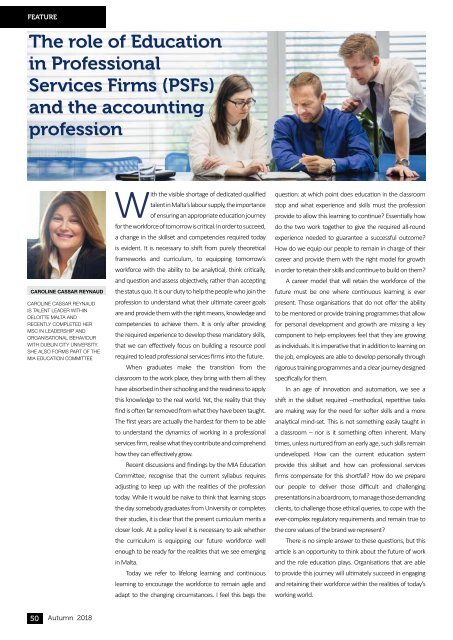THE ACCOUNTANT_AUTUMN_2018_VER-7-L
You also want an ePaper? Increase the reach of your titles
YUMPU automatically turns print PDFs into web optimized ePapers that Google loves.
FEATURE<br />
The role of Education<br />
in Professional<br />
Services Firms (PSFs)<br />
and the accounting<br />
profession<br />
CAROLINE CASSAR REYNAUD<br />
CAROLINE CASSAR REYNAUD<br />
IS TALENT LEADER WITHIN<br />
DELOITTE MALTA AND<br />
RECENTLY COMPLETED HER<br />
MSC IN LEADERSHIP AND<br />
ORGANISATIONAL BEHAVIOUR<br />
WITH DUBLIN CITY UNI<strong>VER</strong>SITY.<br />
SHE ALSO FORMS PART OF <strong>THE</strong><br />
MIA EDUCATION COMMITTEE<br />
With the visible shortage of dedicated qualified<br />
talent in Malta’s labour supply, the importance<br />
of ensuring an appropriate education journey<br />
for the workforce of tomorrow is critical. In order to succeed,<br />
a change in the skillset and competencies required today<br />
is evident. It is necessary to shift from purely theoretical<br />
frameworks and curriculum, to equipping tomorrow’s<br />
workforce with the ability to be analytical, think critically,<br />
and question and assess objectively, rather than accepting<br />
the status quo. It is our duty to help the people who join the<br />
profession to understand what their ultimate career goals<br />
are and provide them with the right means, knowledge and<br />
competencies to achieve them. It is only after providing<br />
the required experience to develop these mandatory skills,<br />
that we can effectively focus on building a resource pool<br />
required to lead professional services firms into the future.<br />
When graduates make the transition from the<br />
classroom to the work place, they bring with them all they<br />
have absorbed in their schooling and the readiness to apply<br />
this knowledge to the real world. Yet, the reality that they<br />
find is often far removed from what they have been taught.<br />
The first years are actually the hardest for them to be able<br />
to understand the dynamics of working in a professional<br />
services firm, realise what they contribute and comprehend<br />
how they can effectively grow.<br />
Recent discussions and findings by the MIA Education<br />
Committee, recognise that the current syllabus requires<br />
adjusting to keep up with the realities of the profession<br />
today. While it would be naïve to think that learning stops<br />
the day somebody graduates from University or completes<br />
their studies, it is clear that the present curriculum merits a<br />
closer look. At a policy level it is necessary to ask whether<br />
the curriculum is equipping our future workforce well<br />
enough to be ready for the realities that we see emerging<br />
in Malta.<br />
Today we refer to lifelong learning and continuous<br />
learning to encourage the workforce to remain agile and<br />
adapt to the changing circumstances. I feel this begs the<br />
question: at which point does education in the classroom<br />
stop and what experience and skills must the profession<br />
provide to allow this learning to continue? Essentially how<br />
do the two work together to give the required all-round<br />
experience needed to guarantee a successful outcome?<br />
How do we equip our people to remain in charge of their<br />
career and provide them with the right model for growth<br />
in order to retain their skills and continue to build on them?<br />
A career model that will retain the workforce of the<br />
future must be one where continuous learning is ever<br />
present. Those organisations that do not offer the ability<br />
to be mentored or provide training programmes that allow<br />
for personal development and growth are missing a key<br />
component to help employees feel that they are growing<br />
as individuals. It is imperative that in addition to learning on<br />
the job, employees are able to develop personally through<br />
rigorous training programmes and a clear journey designed<br />
specifically for them.<br />
In an age of innovation and automation, we see a<br />
shift in the skillset required –methodical, repetitive tasks<br />
are making way for the need for softer skills and a more<br />
analytical mind-set. This is not something easily taught in<br />
a classroom – nor is it something often inherent. Many<br />
times, unless nurtured from an early age, such skills remain<br />
undeveloped. How can the current education system<br />
provide this skillset and how can professional services<br />
firms compensate for this shortfall? How do we prepare<br />
our people to deliver those difficult and challenging<br />
presentations in a boardroom, to manage those demanding<br />
clients, to challenge those ethical queries, to cope with the<br />
ever-complex regulatory requirements and remain true to<br />
the core values of the brand we represent?<br />
There is no simple answer to these questions, but this<br />
article is an opportunity to think about the future of work<br />
and the role education plays. Organisations that are able<br />
to provide this journey will ultimately succeed in engaging<br />
and retaining their workforce within the realities of today’s<br />
working world.<br />
50 Autumn <strong>2018</strong>
















